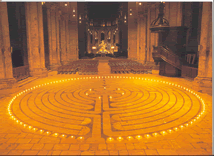All dharma (teachings)
agree at one point.
From the Lojong for the Layperson booklet:
How do we evaluate ourselves or our teachers to see if
the spiritual path we are on is genuine? Buddhist teachings are extensive and
may seem to contradict each other, but at the root of all lineages is a
solution for self-attachment. Looking outward, we shouldn't be led by
popularity or spiritual trappings. Looking inward, we should not be fooled by
fluctuating moods or superficial modifications. The true measure of a teacher
or practitioner is how well they relinquish their preoccupation with the ego.
Successful training will teach us methods to subjugate rather than glorify our
obsession with the self.
Photo: Base of a bald cypress trunk.

A local Episcopal church has a
labyrinth based on the Chartres design; they open it to the public once a month
for contemplative walks. Unlike a maze that has multiple paths, a labyrinth
only has a single pathway to its center. However, its path curves and loops,
going close to the center then moving far away. At times it may feel like you’re
moving in the wrong direction or making no progress at all. I may feel the same
way about my spiritual practice, doubting whether it’s leading me in the right
direction. I may even wonder if I've chosen the right path at all. Is it that I've become complacent or bored, and want something more exciting? Or did I choose
the practice because at the time it was in vogue and seemed entertaining? The nineteenth slogan explains that there is only one criterion we need on our
evaluation sheet: Does it lessen our self-absorption? Self-centeredness is the
root of suffering; an authentic spiritual practice will help dig it out.


No comments:
Post a Comment